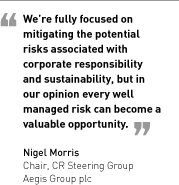Corporate responsibility report
Turning risks Into opportunities /
As mentioned in Principal Risks and Uncertainties, Aegis is exposed to a number of risks associated with corporate responsibility and sustainability. The top 4 risks for our organisation are reflected in the Sustainability Risk Register below. It has been developed with input from a range of internal and external stakeholders, including senior management and our advisors Carbon Smart. Our Risk Register is reviewed annually by the CR Steering Group.
| Risk | Risk assessment | Potential impact on company performance |
Risk management | Opportunity |
|---|---|---|---|---|
Clients
|
Many of our clients have set ambitious sustainability targets. They expect their suppliers, including us, to contribute; not meeting them represents a real risk to business success. |
Not being able to meet our clients’ sustainability strategy and objectives puts us at risk of reducing our capability to grow our business in size and profitability. |
The CR department is responsible for ensuring that progress with Future Proof is shared with our clients – from RFP to pitch to supplier protocols. |
Mitigating this risk ensures we meet our clients’ objectives. Doing it well delivers additional capability to enhance our revenue and profitability through growth. |
Employees
|
As our employees are our biggest asset, they also represent our greatest risk. |
Not meeting employees’ expectations around corporate responsibility puts us at risk of losing our largest asset. It also risks an adverse impact on client relationships, reputation and business growth. |
CR and sustainability are part of our people proposition. The CR department is responsible for delivering and engaging initiatives linked to learning & development. |
Mitigating this risk enhances our ability to attract, retain and develop our talent. Doing it well also improves staff cost control, client satisfaction and business growth. |
Environment
|
Energy consumption and business travel are our largest direct sources of greenhouse gas emissions. They are also the most heavily regulated and have the highest profile with our stakeholders. |
Our expenditure on energy and business travel is one of our largest costs after employee costs and as such is strongly linked to our profitability. But it could also negatively impact on our reputation with our stakeholders. |
The CR department is responsible for the minimum standards and reporting system for greenhouse gas emissions. A network of CR champions has been established to implement sustainable change. |
Mitigating this risk delivers cost savings, maintains cost control, and meets client expectations. Doing it well also produces opportunities to engage employees & clients |
Community
|
There are anti-bribery and business conduct risks associated with community involvement. But not engaging with the community brings the risk of not meeting stakeholder expectations. |
Not addressing our community responsibilities negatively affects our ability to attract, train and retain the best talent. Not managing it well could have a negative impact on our reputation. |
The CR Department oversees the minimum standards and reporting for community involvement. A champion network has been established to implement engaging CR initiatives. |
Mitigating this risk avoids reputational damage and regulatory infringements. Doing it well delivers superior brand value for all stakeholders and enhances consumer insight. |

